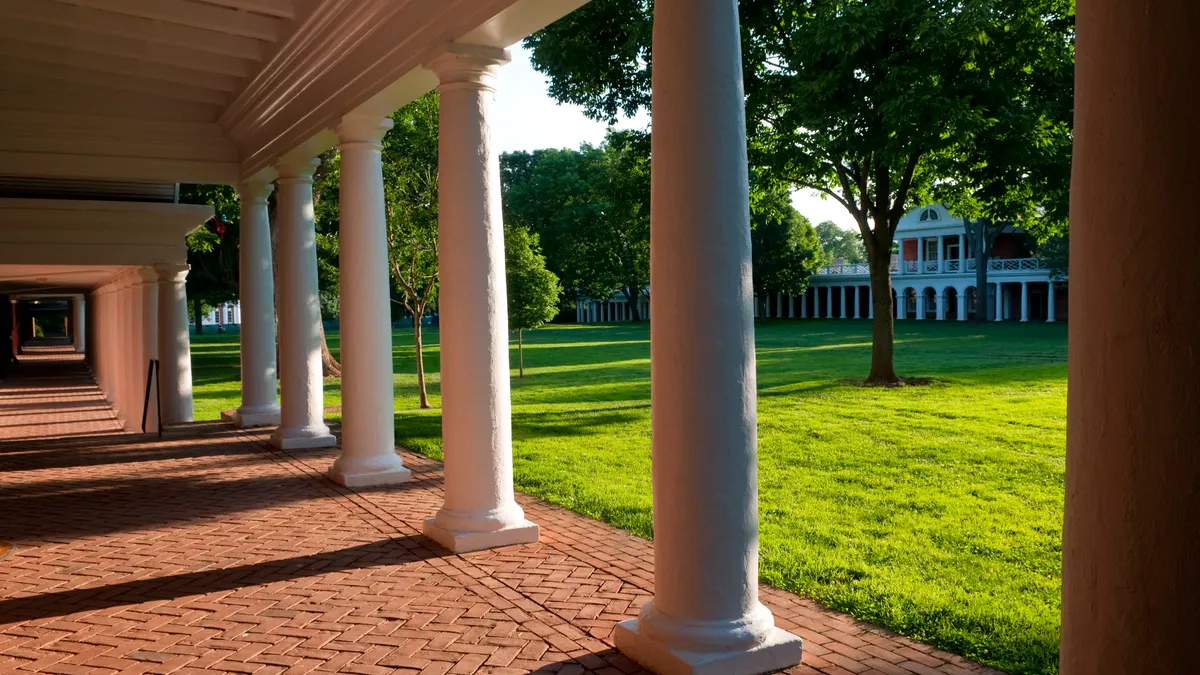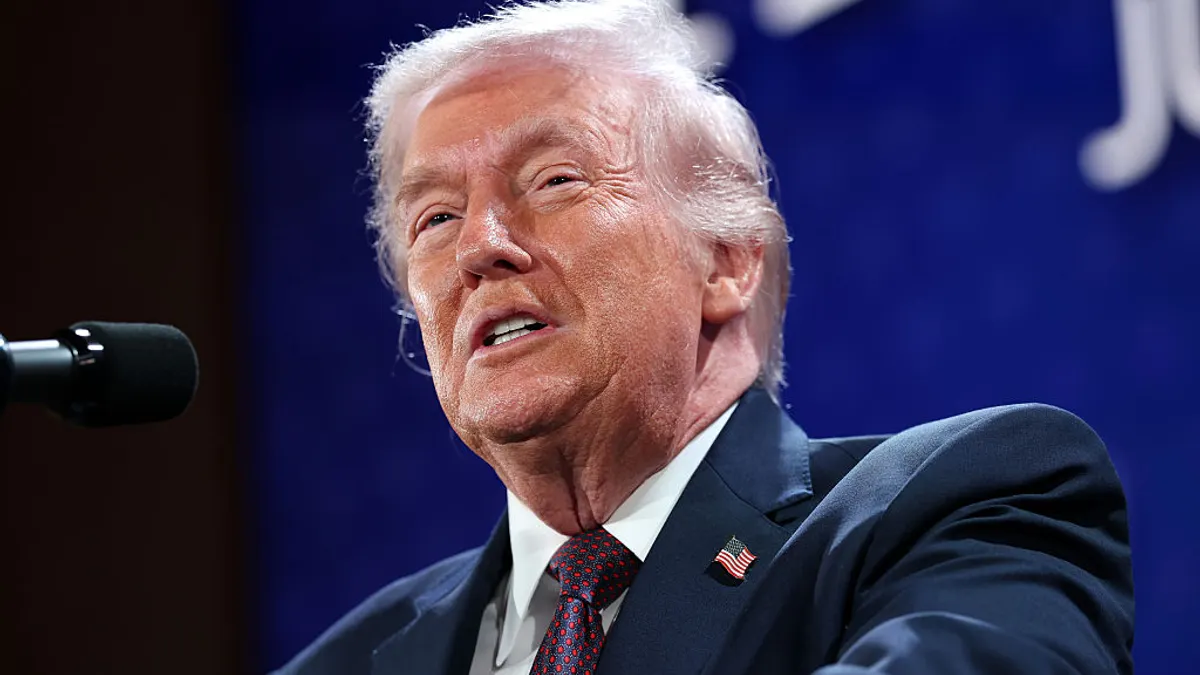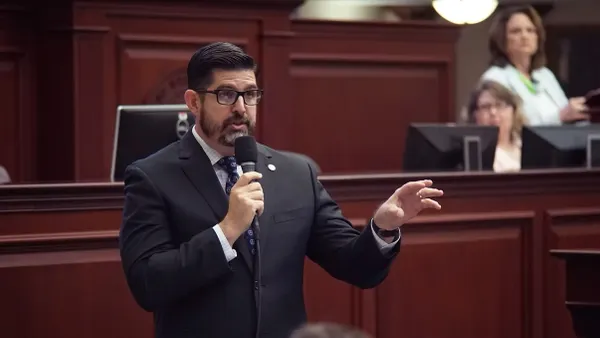Dive Brief:
- University of Virginia faculty and students, as well as Democratic lawmakers from the state, are voicing strong support for outgoing university President Jim Ryan and publicly condemned the Trump administration over his abrupt resignation last week.
- Ryan stepped down as UVA president on Friday, just days after reports surfaced that the U.S. Department of Justice had begun pressuring him to resign over the university's diversity efforts.
- On Saturday, some 200 students and faculty demonstrated on the public flagship's campus to protest Ryan's forced resignation. At the same time, conservative alumni and policymakers celebrated the move and criticized his tenure.
Dive Insight:
Ryan publicly announced he had stepped down as UVA's president on Friday. He took office in 2018, a year after white supremacists held the Unite the Right rally on UVA's campus. The demonstration resulted in hours of violence and one person was murdered. Under Ryan, the university sought to implement new diversity initiatives and improve its campus climate.
But in the years since, such efforts have been castigated by conservatives and President Donald Trump has devoted much of his second term to banning them. Following an anti-DEI executive order from Trump, UVA’s governing board voted in March to dissolve its DEI office.
Ryan's resignation comes amid a DOJ investigation into diversity work at UVA.
"I am inclined to fight for what I believe in, and I believe deeply in this University," he said in his statement. "But I cannot make a unilateral decision to fight the federal government in order to save my own job."
If he stayed in his position, Ryan said, hundreds of university employees would lose their jobs, and hundreds more students could lose financial aid or have their visas withheld. That decision would have been especially "quixotic" and "selfish" because he had already separately decided to retire next year after overseeing the completion of almost all of the university's long-term strategic and capital goals, Ryan said.
UVA has not yet named an interim president or published a timeline for selecting Ryan's permanent replacement. Ryan said he would leave the post by mid-August.
Backlash to DOJ's pressure campaign against UVA leadership came swiftly.
Virginia's senators, Democrats Tim Kaine and Mark Warner, called Ryan's forced resignation "a mistake that hurts Virginia’s future.”
"It is outrageous that officials in the Trump Department of Justice demanded the Commonwealth’s globally recognized university remove President Ryan — a strong leader who has served UVA honorably and moved the university forward — over ridiculous ‘culture war’ traps," they said in a joint statement on Friday.
The senators also noted that, under Virginia's traditional higher ed governance system, university leadership decisions fall solely to the institution's governing board.
Democratic Rep. Bobby Scott of Virginia lambasted the federal government's involvement with UVA's leadership as "an attack on due process, the independence and integrity of ‘academic freedom’ in higher education, and the UVa’s effort to address its own history." Scott is the ranking member of the House Committee on Education and Workforce.
In contrast, Harmeet Dhillon, assistant attorney general for civil rights at DOJ, blasted Ryan for not working with the Trump administration.
“I don’t have any confidence that he was going to be willing and able to preside over the dismantling of DEI,” Dhillon said on CNN Friday. She added that the federal government "can't be giving out billions of dollars" to institutions that "refuse to follow federal law."
The Jefferson Council, an organization dedicated to "preserving Thomas Jefferson's legacy" at the University of Virginia, celebrated Ryan's removal and lampooned his leadership of the state flagship as "politicized and feckless."
Joel Gardner, president of the group, said that Ryan's resignation should only be the first step.
“This resignation signals a turning point for the University,” he said in a statement. “UVA must now depoliticize its academic environment, abandon discriminatory practices, and return to its true purpose: educating students in a culture of civil dialogue, intellectual diversity, and the free exchange of competing ideas."
The UVA Faculty Senate, which affirmed its support of Ryan's leadership earlier this year, instead condemned the DOJ demands that led to his resignation in a resolution Friday. It also called on the university's governing board to meet with the senate's members by July 14 "to clarify the circumstances and negotiations that led to the resignation of President Ryan."
Separate from Ryan's resignation, UVA's board of visitors has been a source of controversy in recent weeks.
The 17-person board is appointed by Virginia's governor, who is currently Republican Glenn Youngkin. Youngkin recently exercised that power to appoint four members to UVA's board.
But his selections must be approved by the state General Assembly, which declined to do so in early June. Instead of selecting replacements, Younkin directed his appointments to begin serving anyway.
Last week, the state Senate sued the rector of the UVA board, along with the rectors at George Mason University and the Virginia Military Institute, to stop the rejected appointees from taking office.














